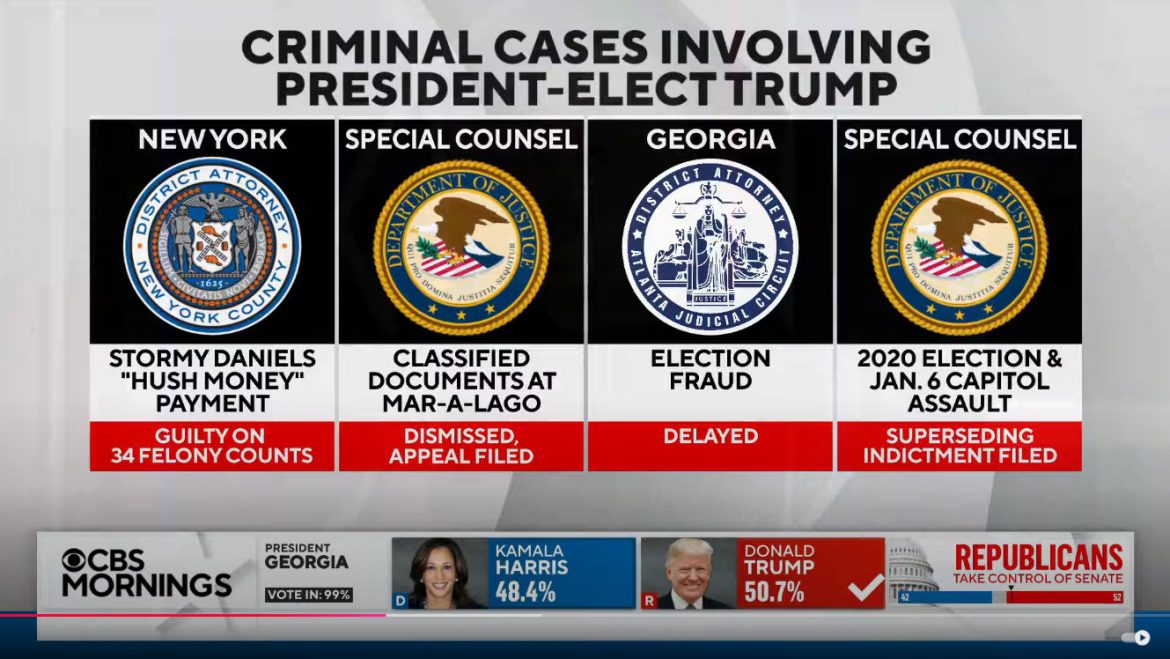The Department of Justice (DOJ) is reportedly moving to wind down several pending criminal cases against President-Elect Donald Trump before he officially takes office. This decision aligns with a longstanding DOJ policy that prohibits the prosecution of a sitting president, effectively putting a pause on Trump’s legal challenges during his upcoming term. NBC News reports that this approach would apply to both federal cases and potentially influence state-level cases that have garnered national attention.
The cases in question include Trump’s federal indictments, which have sparked considerable public interest and controversy, as well as a New York state case involving hush money payments and a Georgia election interference case. While these state-level cases fall outside federal jurisdiction, legal experts suggest that Trump’s status as President-Elect could place them in a legal gray area, effectively freezing any movement until he leaves office.
Federal Cases Likely to Be Dropped Before Inauguration
The DOJ’s reported decision to halt Trump’s federal cases reflects the department’s adherence to an unwritten but well-established policy that protects sitting presidents from prosecution. Legal analysts indicate that while Trump’s federal cases, including those related to alleged election interference and other accusations, have been active for months, his presidential status may shield him from continued prosecution. If the DOJ follows through, the criminal charges will be dropped or deferred until Trump leaves office.
This shift has stirred mixed reactions among legal experts and political commentators. While some argue that the DOJ is simply following policy, others view it as a troubling precedent, raising questions about accountability for actions taken before a president assumes office. Notably, Trump’s New York state hush money case is moving towards a sentencing phase this month, but legal scholars believe it may be suspended for the next four years, reflecting similar protections.
One high-profile case that has attracted attention is the Georgia election interference investigation. Trump is facing accusations of attempting to alter the outcome of the 2020 presidential election in the state, with charges relating to a recorded phone call in which he allegedly urged Georgia officials to “find” enough votes to overturn the results. This case has progressed further than others, but experts note that its continuation may be legally complicated by Trump’s status as a sitting president once he assumes office.
Texas Republicans Mount Legal Defense, Challenge DOJ’s Authority
In Texas, Attorney General Ken Paxton has filed a legal brief aimed at defending Trump against the DOJ’s investigation into alleged election interference. Paxton claims that the special prosecutor leading the federal investigation into the 2020 election was appointed without congressional authorization, calling the prosecution of a former president “unprecedented” and urging judicial intervention. The brief argues that the DOJ’s appointment of a special prosecutor violates the separation of powers and asks a judge to curtail the DOJ’s actions against Trump.
With Republicans gaining momentum after Trump’s election victory, many are rallying behind efforts to halt investigations they view as politically motivated. GOP lawmakers argue that pursuing legal cases against a sitting president undermines the office’s sanctity and threatens stability. “This is not about protecting an individual, but preserving the integrity of the presidency,” one Texas official stated, adding that the legal challenges faced by Trump should be deferred until he completes his term.
Republicans’ legal defense for Trump is expected to gain traction as he prepares for office, with supporters framing the legal actions as attempts to limit political bias in the judiciary. Critics, however, worry that these moves set a dangerous precedent, potentially allowing sitting presidents to evade accountability for pre-office actions.
Legal Experts React to DOJ Decision
Legal analysts are divided over the implications of pausing or dropping Trump’s legal cases. Some argue that this approach is essential to prevent distractions that could interfere with presidential duties, noting that similar principles applied to previous administrations. However, others argue that no individual, including a president, should be immune from accountability, particularly in cases involving potential misconduct.
“This decision by the DOJ reflects a real balancing act between maintaining the office’s respect and enforcing the rule of law,” commented Professor Elaine Garber, a constitutional law expert. “While it’s true that prosecuting a sitting president poses practical challenges, it’s equally crucial to ensure that no one is above the law.”
For Trump, the DOJ’s move comes as a relief, allowing him to focus on his presidential transition and upcoming term without the specter of federal prosecution. During his recent victory speech, he focused on the future, promising to lead America into a “golden age” while reaffirming his commitment to economic growth and national security. However, the legal challenges surrounding his past actions continue to cast a shadow over his administration’s start.
As the nation prepares for Trump’s second term, the DOJ’s decision is likely to be scrutinized both domestically and internationally. If the cases are officially dropped, it would mark an unprecedented pause in legal proceedings against a high-profile individual whose actions continue to spark national debate.
Future of Trump’s Legal Cases
The DOJ is expected to provide clarity on the future of Trump’s legal cases in the coming weeks. Meanwhile, New York prosecutors and Georgia officials are evaluating how to proceed with their respective cases, though many experts expect they may be deferred until Trump leaves office. Trump’s legal team remains optimistic, believing that his status as President-Elect offers him sufficient legal protections for the next four years.
This unfolding scenario sets the stage for continued debate on the intersection of presidential authority, legal accountability, and the limitations of executive privilege. As Trump prepares for office, the resolution of these cases could redefine the legal boundaries for future presidents.



